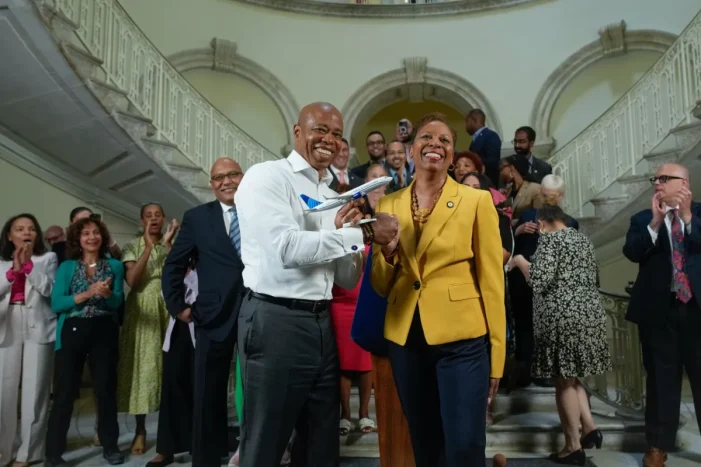Mayor Eric Adams and Council Speaker Adrienne Adams at City Hall on Friday, June 28, 2024. Credit: Michael Appleton / Mayoral Photography Office
By Katie Honan
Mayor Eric Adams and Speaker Adrienne Adams shook hands Friday in a tepid ceremony celebrating an agreement on a $112.4 billion budget that they both said addressed some of the biggest issues for working-class New Yorkers.
It’s the third annual budget passage from the pair the mayor has dubbed the “Adams and Adams law firm,” harkening back to their shared last name, high school and upbringing.
“This body of people and public servants have done something that no one thought we could do, and if you like it or not, we have been successful,” Adams said, addressing questions about whether the budget would get done by the June 30 deadline.
He’s previously said they would “land the plane” on time — and on Friday brought a model airplane to City Hall’s rotunda as part of the announcement.
“We have done our job and we have continued to do our job in the right way and continue to deliver for the people, the working-class people who have often been ignored,” he added.
Speaker Adams said their “North Star” was a “strong and stable foundation” for New Yorkers.
“We believed in the strength of this city and its resilient economy,” she said.
“We were clear about the challenges, but we were also clear that we have the resources to invest in New Yorkers and protect what they rely on.”
Queens Gets Some Money
The final draft includes a billion dollars more than the mayor’s proposed executive budget from April, and restores previously-announced cuts to library funding — more than $58 million — which will allow most branches to stay open Sundays.
The budget also includes tens of millions of dollars to build a new trauma center on the Rockaway Peninsula, which was pushed by Councilmember Selvena Brooks-Powers. THE CITY has reported that gunshot victims in the city are most likely to die in Queens due in part to limited access to trauma care in the southeast part of the borough.
The new budget deal also makes permanent funding for some programs, like summer camps and literacy education, which were previously paid for by federal COVID stimulus dollars.
Deputy Speaker Diana Ayala (D-East Harlem) described the budget negotiations as a “harder push” to convince the Office of Management and Budget — which took a more conservative outlook of the city’s finances — that money was there.
“The [Council] members were not going to agree to a budget until our priorities were restored. I think that they got that message loud and clear, but we did it in a civilized manner,” she told THE CITY.
“Overall, I think it was a really good budget, we got a lot of wins in, we got a lot restored but we also got a lot baselined. There’s still always a lot of work to do,” Ayala added.
Ana Champeny, the vice president of research at the Citizens Budget Commission, stressed before the budget was released that the city needed to sock away more money into its reserves.
The current adopted budget has $8.2 billion in reserves, including $1.96 in a “rainy day fund” and $1.2 billion in the general reserve, according to the city. That’s an increase in total reserves from last year, when there were $8 billion stashed away, although the “rainy day fund” was higher last year at $2 billion.
The council is expected to vote Sunday on the budget deal, which would then go into effect on Monday, July 1, the start of the city’s fiscal year.
This story was published by THE CITY on June 28, 2024.

